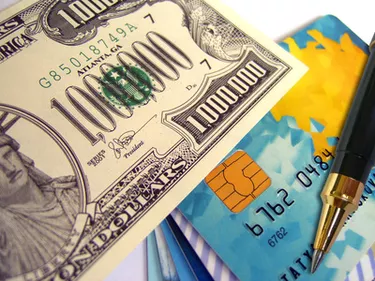
There is nothing quite like the stress of trying to use your debit card, only to have it declined, especially when you know that your bank account shows plenty of funds available. Sometimes a card is declined when it is labeled as a hot card by your bank. When this happens, you will not be able to use it to make any purchases, even if you have plenty of money available. Unfortunately, until you get things squared away with your bank, you will need to find another way to pay.
Hot Card in Banking
Video of the Day
According to Law Insider, when your bank labels your debit card a hot card, that means that it has been reported as or is suspected of being lost or stolen. Keep your eyes peeled for emails, texts or calls from the fraud department of your bank. If they notice that your card shows unusual activity in strange places or for large amounts, they will likely flag your account, freeze it and assume it is fraud until they get in touch with you.
Video of the Day
Your card could also be labeled as hot if you have called in to report that it is missing or that you notice unusual activity, like purchases you did not authorize. Banks do not list cards as hot unless they have a reason to believe something is wrong, so if your debit card is not working when you know you have money in your account, this should be a red flag to get in touch with your bank right away.
Warm Carded in Banking
While the term "warm carded" sounds similar to "hot carded," they are actually two different terms in the world of banking. Investopedia says that a warm card is a special type of business debit card that allows employees to make deposits but not withdrawals.
If the debit card that does not work is from your place of employment, it could be that you have been warm carded. Your employer might want you to have account access to make daily deposits, but they have not given you purchasing permissions. So, if you try to buy business supplies with your business debit card, your transaction will always be denied.
Customer Care for Hot Cards
On the advice of the Federal Trade Commission, if you notice that your debit card is not working or that there are unusual charges on your account, you should get in touch with your financial institution right away. Be prepared to have your account name, account number and answers to security questions at the ready. You might also jot down each transaction day, place and amount that you did not authorize.
When you call your bank, they will verify your account, security information and transactions. If they conclude that your account is indeed compromised, you will no longer be able to make purchases using your debit card. The financial institution will issue you a new debit card with a new number that will take several business days to arrive. In the meantime, you will need to withdraw cash through a teller or use another card to make purchases.
Security Considerations and Hot Cards
Once your debit card has been hot-carded and the bank has addressed the security concerns regarding your account, you could have a bit of security footwork to do on the back end. Oftentimes, card numbers are procured through hacking, so it is likely prudent to go through and change your passwords on any websites that have stored your financial information.
In addition, even though it is convenient to store card information on websites, you might consider whether this is truly the best idea from a financial security perspective. You might also ensure that your wallet and purse are RFID-protected so that people cannot easily obtain your credit card information with scanners while you are out and about.